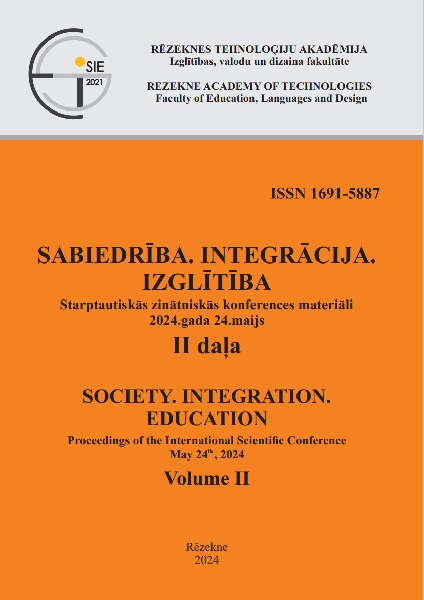DEVELOPMENT OF HEALTH COMPETENCE OF CHILDREN WITH DIABETES MELLITUS IN THE SUMMER CAMP ENVIRONMENT
DOI:
https://doi.org/10.17770/sie2024vol2.7855Keywords:
diabetes mellitus, education, health competence, summer campAbstract
Diabetes mellitus is becoming a leading disease in paediatric endocrinology, which causes health problems and complications that can shorten life expectancy. The object of the research is the development of health competence of children with diabetes mellitus in the summer camp environment. Research aim is to reveal the development of health competence of children with diabetes mellitus in the summer camp environment. Tasks: 1) to identify the development of health competence in the environment of summer camps; 2) to reveal health topics being discussed by children in summer camps; 3) to reveal pedagogical interactions between the educator and the students in the environment of summer camps. Research methods: theoretical: analysis, generalisation and systematisation of scientific literature; empirical: document analysis. The research found that not only does the environment of summer camps contribute to the development of health competence of children with diabetes mellitus but it also encourages them to fully get used to living with the disease and creates a favourable educational environment that encourages communication. The research revealed that in the summer camp environment children discuss the following topics: blood sugar control, causes of diabetes mellitus and independence in managing the disease. The summer camp environment is friendly, active as well as engaging and tolerant of learner interaction.
References
Coats, T. C., Hill, E., Ramsing, R., Reifschneider, K. & Haegele, J. A. (2021). Parent observations at family diabetes camp: An impact study. Recreations, parks, and tourism in public health, 5, 93–108.
Dewey, J. (1938). Experience and Education. New York: Macmillan Company.
Devi, D. R., Bai, A. & Nagarajan, N. (2020). A novel hybrid approach for diagnosing diabetes mellitus using farthest first and support vector machine algorithms. Obesity medicine, 17, 87 – 95.
Ergun-Logmire, B., Clemente, E., Vining-Maravolo, P., Roberts, C., Buth, K. & Greydanus, D. E. (2021). Diabetes education in pediatrics: How to survive diabetes. Disease-a-Month, 67(8), 102–112.
Gedvilienė, G. & Zuzevičiūtė, V. (2007). Edukologija: mokomoji knyga studentams. Kaunas: Vytauto Didžiojo universiteto leidykla.
Gudžinskienė, V. (2010). Kompetencijų įgijimo prielaidos ir sveikatos bei kai kurių socialinių kompetencijų raiška. Mokslo darbų apžvalga. Vilnius: Vilniaus pedagoginis universitetas.
Glaser, B. & Strauss, A. (2012) The Discovery of Grounded Theory: Strategies for Qualitative Research. Aldine Transaction: New Brunswick.
Hasan, I., Chowdhury, A., Haque, I. & Patterson, C. C. (2020). Changes in glycated hemoglobin, diabetes knowledge, quality of life, and anxiety in children and adolescents with type 1 diabetes attending summer camps: A systematic review and meta-analysis. Pediatric diabetes, 22(2), 124–131.
Hill, E. L., Reifschneider, K., Ramsing, R., Turnage, M. & Goff, J. (2019). Family diabetes camp: fostering resiliency among campers and parents. Diabetes spectrum, 32(2), 86–92.
Institute of hygiene (2020). Sveikatos statistika. Retrieved from: https://www.hi.lt/sveikatos-statistika.html.
Ivaškienė, J. & Malinauskienė, D. (2021). Pradinių klasių mokinių ugdymas: kokybės aspektas. Švietimas: politika, vadyba, kokybė, 13(1), 10–21.
Kairaitis, Z. (2012). Nuo sinergazijos iki sinergetikos: J. Vabalo-Gudaičio sąveikos pedagogikos žymės ir linkmės. Logos, 72, 92–98.
Kurki, M., Jarvenoja, H. & Jarvela, S. (2018). Exploring Regulatory Interactions Among Young Children and Their Teachers: A Focus on Teachers’ Monitoring Activities. Varhaiskasvatuksen Tiedelehti. Journal of Early Childhood Education Research, 7(2), 310–337.
Piaget, J. (2002). Vaiko kalba ir mąstymas. Vilnius: Aidai.
Tumini, S., Comegna, L., Fioretti, E., Guidone, P., Levantini, G., Panichi, D. & Cipriano, P. (2020). Effectiveness and safety of flexible therapeutic schemes including first- and secondgeneration basal insulins during a pediatric summer diabetes camp. Pediatrics report, 12(1), 14–19.
Žydžiūnaitė, V. & Sabaliauskas, S. (2017). Kokybiniai tyrimai. Principai ir metodai. Kaunas: Socialiniai mokslai.






